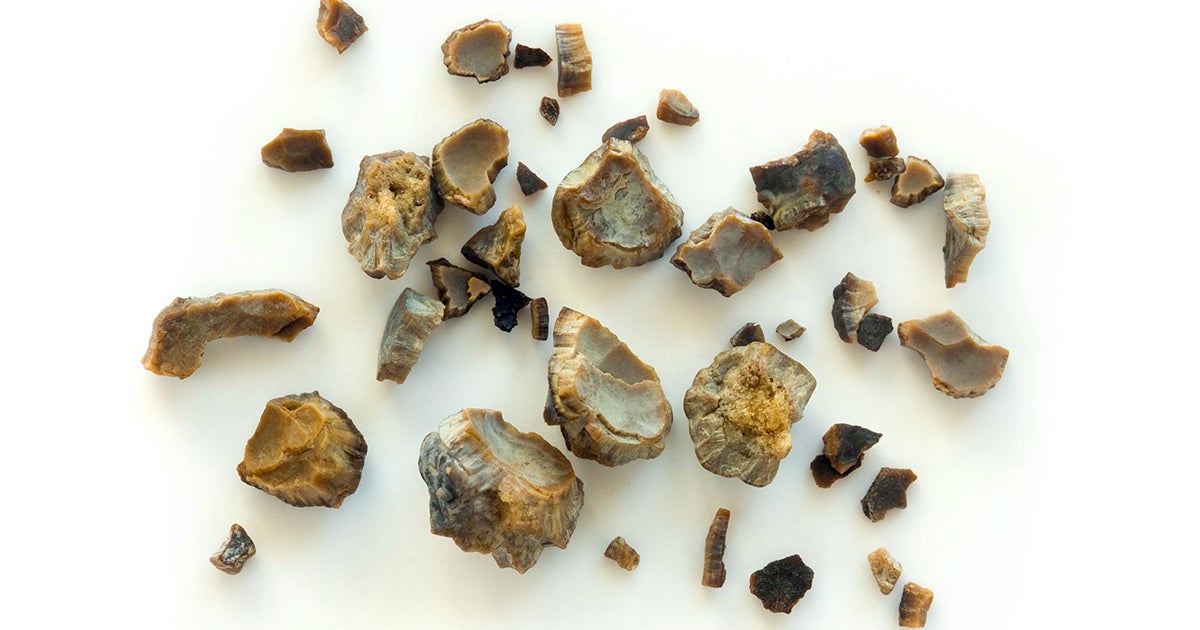A kidney stone is a hard, crystalline mineral material formed within the kidney or urinary tract. Kidney stones are a common cause of blood in the urine (hematuria) and often severe pain in the abdomen, flank, or groin. Kidney stones are sometimes called renal calculi.
Kidney stones form when there is low urine volume and/or an excess of stone-forming substances in the urine. The most common type of kidney stone contains calcium with oxalate or phosphate. A majority of kidney stones are calcium stones. Other chemical compounds that can form stones in the urinary tract include uric acid, magnesium ammonium phosphate, and the amino acid cyseine.


Symptoms
- Severe pain in the side and back, below the ribs
- Pain that radiates to the lower abdomen and groin
- Pain that comes in waves and fluctuates in intensity
- Pain on urination
- Pink, red or brown urine
- Cloudy or foul-smelling urine
- Nausea and vomiting
- Persistent need to urinate
- Urinating more often than usual
- Fever and chills if an infection is present
- Urinating small amounts
Seek immediate medical attention if you experience:
- Pain so severe that you can't sit still or find a comfortable position
- Pain accompanied by nausea and vomiting
- Pain accompanied by fever and chills
- Blood in your urine
- Difficulty passing urine
Types of kidney stones
- Calcium stones. Most kidney stones are calcium stones, usually in the form of calcium oxalate.Dietary factors, high doses of vitamin D, intestinal bypass surgery and several metabolic disorders can increase the concentration of calcium or oxalate in urine.Calcium stones may also occur in the form of calcium phosphate. This type of stone is more common in metabolic conditions, such as renal tubular acidosis.
- Struvite stones. Struvite stones form in response to an infection, such as a urinary tract infection.
- Uric acid stones. Uric acid stones can form in people who don't drink enough fluids or who lose too much fluid, those who eat a high-protein diet, and those who have gout. Certain genetic factors also may increase your risk of uric acid stones.
- Cystine stones. These stones form in people with a hereditary disorder that causes the kidneys to excrete too much of certain amino acids (cystinuria).
Risk factors
Factors that increase your risk of developing kidney stones include:
- Family or personal history. If someone in your family has kidney stones, you're more likely to develop stones, too.
- Dehydration. Not drinking enough water each day can increase your risk of kidney stones. People who live in warm climates and those who sweat a lot may be at higher risk than others.
- Certain diets. Eating a diet that's high in protein, sodium (salt) and sugar may increase your risk of some types of kidney stones. Too much salt in your diet increases the amount of calcium your kidneys must filter and significantly increases your risk of kidney stones.
- Being obese. High body mass index (BMI), large waist size and weight gain have been linked to an increased risk of kidney stones.
- Digestive diseases and surgery. Gastric bypass surgery, inflammatory bowel disease or chronic diarrhea can cause changes in the digestive process that affect your absorption of calcium and water, increasing the levels of stone-forming substances in your urine.
- Other medical conditions. Diseases and conditions that may increase your risk of kidney stones include renal tubular acidosis, cystinuria, hyperparathyroidism, certain medications and some urinary tract infections.
Home remedies to dissolve kidney stones naturally.
Ingradients:
Coriander leaves and seeds.

Coriander (Coriandrum sativum), also called cilantro, koththamalli (in Tamil), or dhania (in Hindi) is an annual herb in the family Apiaceae.
Coriander is an excellent source of minerals like calcium, potassium, manganese, iron, and magnesium. It is also rich in many vital vitamins essential for optimum health including vitamin-A, beta carotene, vitamin-C and folic acid. By the way, vitamin-C is a powerful natural antioxidant.
Coriander leaves and seed act as antioxidants, Chemicals derived from coriander leaves were found to have antibacterial activity against Salmonella choleraesuis, caused in part by these chemicals acting as nonionic surfactants.
Coriander seeds are used in traditional Indian medicine as a diuretic (a substance or drug that tends to increase the discharge of urine) by boiling equal amounts of coriander seeds and cumin seeds, then cooling and consuming the resulting liquid.
The powerful anti-inflammatory capacities of coriander can help one deal with symptoms of arthritis. Coriander also increases HDL cholesterol (the good) and reduces LDL cholesterol (the bad).
Procedure:
Take 2 table spoons of coriander seeds and one cup full of fresh coriander leaves in a container and add up to 1000 ml of water.
Boil the seeds and leaves with water 15 to 20 minutes until it become like dicoction.
Keep the mixture for 30 minutes and let it cool at room temperature. Then filter the mixture and dilute (add some more water) up to 1 litre.

Drink that water daily upto 1 litre for atleast 30 to 45 days. The stone formed in the kidneys or other parts of urinary tract will dissolve and pass through urinary tract naturally.

No comments:
Post a Comment